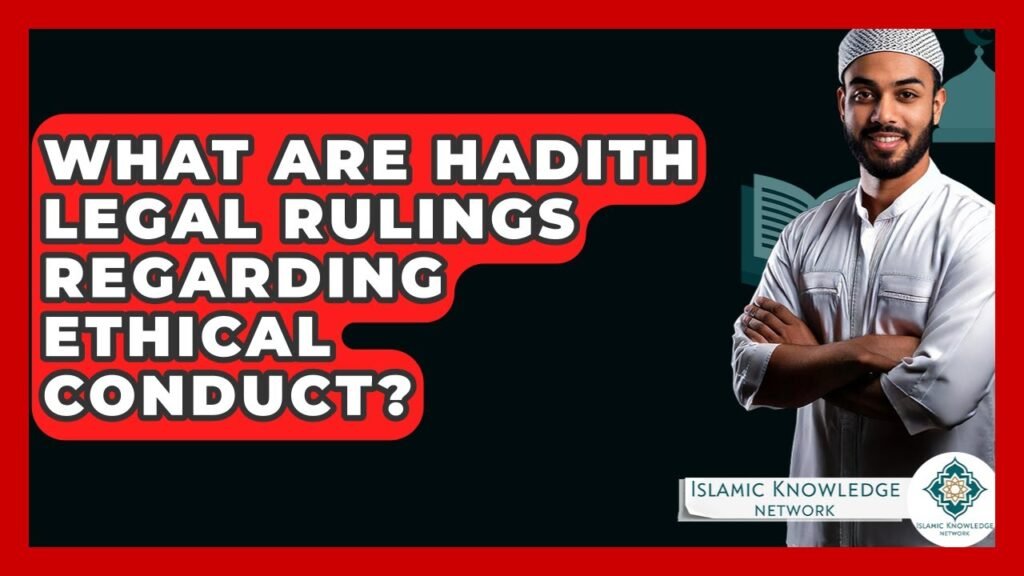Disclaimer:
The content published on this website is provided for general informational purposes only. Articles are generated with the assistance of artificial intelligence and are reviewed periodically; however, accuracy cannot be guaranteed in all cases. Readers are encouraged to verify important information from reliable and authoritative sources before relying on it. The website does not intend to mislead, and any errors found will be corrected when identified.
In the rich tapestry of Islamic jurisprudence, Hadith serves as a vital thread, offering invaluable guidance on ethical conduct. This body of teachings, attributed to the Prophet Muhammad (peace be upon him), not only elucidates the core principles of morality and integrity but also plays a crucial role in shaping the daily lives of Muslims around the globe. As believers strive to embody the teachings of Islam, understanding the Hadith legal rulings surrounding ethical conduct becomes imperative for fostering a just and harmonious society.
At Airlink Hajj and Umrah, we recognize the importance of aligning one’s actions with these teachings, especially for those embarking on the sacred journeys of Hajj and Umrah. Our blog is dedicated to providing you with the latest updates on these pilgrimages, ensuring that your spiritual experience is not only fulfilling but also in harmony with Islamic teachings. As you explore the Hadith on ethical conduct, we invite you to integrate these profound lessons into your life, enhancing not just your devotion but also your interactions with others. Join us in deepening your understanding of Islamic teachings while preparing for a transformative journey that is enriched by the wisdom of Hadith.
What Are Hadith on Ethical Conduct in Islamic Legal Rulings?
Hadith, the sayings and actions of Prophet Muhammad (peace be upon him), play a pivotal role in shaping Islamic legal rulings and ethical conduct. These teachings emphasize integrity, fairness, and respect in all dealings. For example, the Prophet said, “The best among you are those who have the best manners and character” (Bukhari). This underscores the importance of ethical behavior in everyday interactions, which extends to legal matters as well.
In Islamic jurisprudence, ethical conduct is not merely a suggestion but a requirement. Hadith that advocate for honesty, transparency, and justice guide scholars and practitioners in formulating rulings. The Hadith “Whoever cheats is not one of us” (Muslim) clearly indicates that dishonesty in any form undermines the moral fabric of the community. Thus, ethical conduct is essential for maintaining trust and justice in society.
At airlinkhajjandumrah.com, we recognize the importance of these teachings, especially during Hajj and Umrah, where ethical interactions are paramount. We strive to keep our readers informed with the latest updates on rituals and guidelines, ensuring that everyone can perform these sacred acts with the utmost integrity and respect rooted in Hadith.
FAQ on “What Are Hadith on Ethical Conduct in Islamic Legal Rulings?”
FAQ 1: What is a Hadith in the context of Islamic jurisprudence?
Answer: A Hadith is a record of the sayings, actions, and approvals of the Prophet Muhammad, which serve as a source of guidance for ethical conduct and legal rulings in Islam.
FAQ 2: Why are Hadith important for ethical conduct in Islamic legal rulings?
Answer: Hadith provide insights into the Prophet’s example and teachings, helping to shape moral principles and ethical guidelines that inform legal rulings within Islamic jurisprudence.
FAQ 3: Are all Hadith equally regarded when considering ethical conduct?
Answer: No, Hadith are classified into different categories such as Sahih (authentic), Da’if (weak), and Hasan (good), affecting their reliability and weight in legal decisions.
FAQ 4: How do Hadith align with the Quran regarding ethical conduct?
Answer: Hadith complement the Quran by providing practical examples and detailed contexts for ethical behavior, enhancing the understanding of Islamic teachings.
FAQ 5: Can individual interpretations of Hadith lead to variations in ethical rulings?
Answer: Yes, differing interpretations of Hadith can lead to variations in legal rulings as scholars consider context, authenticity, and differing schools of thought in Islam.
Mushu, an experienced Saudi Arabia traveler and writer, shares insightful tips and spiritual reflections to enhance Hajj and Umrah journeys for fellow pilgrims. He has been to Makkah and Madina from 2016 to 2023 many times and his posts will reflect this.







